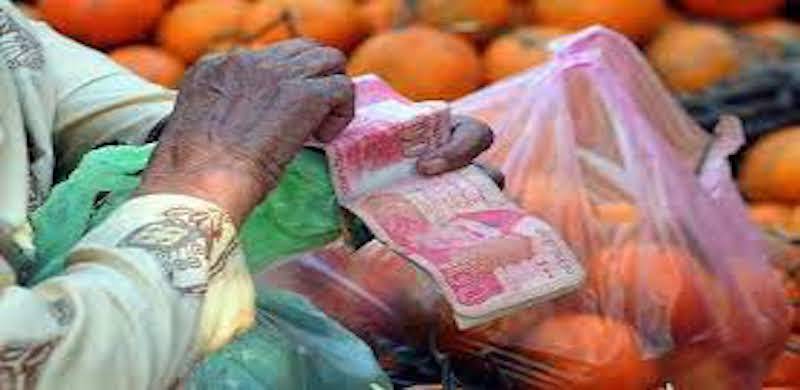
Consumer prices rose significantly in the outgoing week, as prices of staple commodities like onions, chicken, eggs, rice, cigarettes and fuel rose, according to official data of the Pakistan Bureau of Statistics (PBS). This trend pushed the weekly inflation index to over 40% for the first time in over five months. It was on 1 September 2022 that this indicator was last recorded at 45.5%.
Of the 51 items tracked, the prices of 33 items increased, those of 6 items decreased, while those of 12 items remained moderately stable when compared week-on-week.
Though week-on-week inflation eased somewhat slightly, it nevertheless remained high as bananas, chicken, sugar, cooking oil, gas and cigarettes became costlier, as per PBS data. Due to this, short-term inflation measured by Sensitive Price Indicator (SPI) jumped to 41.54% on a year-on-year basis for the week ended on 23 February, rising from 38.42% in the previous week.
The week-on-week inflation eased to 2.78% from 2.89% a week ago. The previous week-on-week reading of 2.89% reading was the highest since 27 October, when the SPI differential was 4.13%.
Government steps to 'ease' inflation
Headline inflation measured by the Consumer Price Index (CPI) was recorded at 27.6% during January. However, the government has been taking strict measures under IMF conditions that are likely to further cool the economy and stoke inflation. These measures include the adoption of a market-based exchange rate, a hike in fuel and power tariffs, the withdrawal of subsidies, and more taxation to generate revenue that would bridge the burgeoning deficits.
Pakistan’s economy has been in turmoil for months, and desperately needs external sources financing as its foreign exchange reserves have dwindled to nearly $3 billion, which is barely enough for three weeks’ worth of imports.
In a small glimmer of hope, China this week announced refinancing of $700 million, which was received by the State Bank of Pakistan (SBP) on Friday.
Of the 51 items tracked, the prices of 33 items increased, those of 6 items decreased, while those of 12 items remained moderately stable when compared week-on-week.
Though week-on-week inflation eased somewhat slightly, it nevertheless remained high as bananas, chicken, sugar, cooking oil, gas and cigarettes became costlier, as per PBS data. Due to this, short-term inflation measured by Sensitive Price Indicator (SPI) jumped to 41.54% on a year-on-year basis for the week ended on 23 February, rising from 38.42% in the previous week.
The week-on-week inflation eased to 2.78% from 2.89% a week ago. The previous week-on-week reading of 2.89% reading was the highest since 27 October, when the SPI differential was 4.13%.
Government steps to 'ease' inflation
Headline inflation measured by the Consumer Price Index (CPI) was recorded at 27.6% during January. However, the government has been taking strict measures under IMF conditions that are likely to further cool the economy and stoke inflation. These measures include the adoption of a market-based exchange rate, a hike in fuel and power tariffs, the withdrawal of subsidies, and more taxation to generate revenue that would bridge the burgeoning deficits.
Pakistan’s economy has been in turmoil for months, and desperately needs external sources financing as its foreign exchange reserves have dwindled to nearly $3 billion, which is barely enough for three weeks’ worth of imports.
In a small glimmer of hope, China this week announced refinancing of $700 million, which was received by the State Bank of Pakistan (SBP) on Friday.

